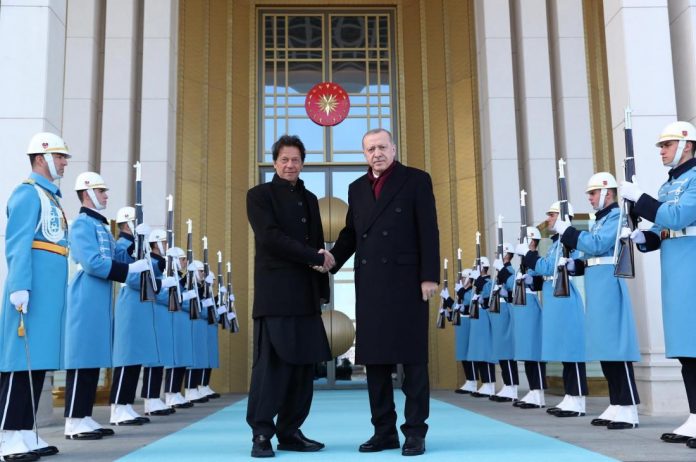Appearing recently in a talk show on ARY News, Pakistan’s Foreign Minister Shah Mehmood Qureshi warned that if the Organization of Islamic Cooperation (OIC) will not convene a meeting of the Council of Foreign Ministers (CFM) on Kashmir, Prime Minister Imran Khan would hold it on his own with his close partners among the Islamic countries. “If you cannot convene it, then I’ll be compelled to ask Prime Minister Imran Khan to call a meeting of the Islamic countries that are ready to stand with us on the issue of Kashmir…” said the foreign minister.
Pakistan has been constantly pushing the 57-member organization – the second largest intergovernmental body after the United Nations – for a foreign ministers’ meeting revolving around the decision of India to revoke the special status of Jammu and Kashmir (J&K). However, the OIC has not given any positive response to Pakistan’s request so far. Pakistan’s efforts indicate that it would want to internationalize an issue that has been agreed upon by both New Delhi and Islamabad to remain bilateral based on the Simla Agreement.
Strained Relations between Pakistan and Saudi Arabia
These actions of Pakistan do not only significantly provoke the operationalization and unity of the OIC but also strains its relations with Saudi Arabia and the Gulf countries. In what is assumed to come at the back-drop of Pakistan’s actions, Saudi Arabia has deferred to renew a pact to supply oil to Pakistan on deferred payments. An agreement between Pakistan and Saudi Arabia for provision of $3.2 billion worth of oil on deferred payments per annum has expired two months ago and a decision about its renewal remains pending with Riyadh.
The $3.2 billion Saudi oil facility was part of the $6.2-billion Saudi Arabian package announced in November 2018 to ease Pakistan’s external sector issues. Pakistan has already prematurely returned $1 billion Saudi loan – four months ahead of its repayment period; however, Riyadh has not provided the oil on deferred payments since May this year. The budget estimates suggested that the Pakistan government was hoping to receive minimum $1 billion worth of oil in fiscal year 2020-21, which started from July.
In a similar vein, The United Arab Emirates (UAE) had also announced a $6.2 billion package for Pakistan in the year 2018, including a $3.2 billion oil facility. However, later on, the UAE reduced its financial assistance to $2 billion and also shelved the plan to give the $3.2 billion oil facility on deferred payments.
The Pakistan-Turkey Nexus
Another major reason for OIC’s lack of support for Pakistan has been Riyadh’s displeasure with Islamabad’s increasing proximity with Turkey under the leadership of President Erdogan who nurtures the ambition of replacing Saudi Arabia as the de facto leader of the Islamic countries.
Turkey has shown great support for Pakistan on several occasions with respect to the latter’s strategic interests. Earlier on September 24, 2019, Erdogan told the United Nations General Assembly that the international community has “failed” to “pay enough attention” to the Kashmir conflict, which “awaits solution” for 72 years.
This year, relations between Turkey and Pakistan enhanced significantly with President Erdogan’s open support for Pakistan in Kashmir, as well as a pledge of the Turkish leadership to help Islamabad in the conflict with the Financial Action Task Force (FATF) — an intergovernmental organization that works to combat money laundering related to crime and terror financing. He further stated that, “as in the past, we will continue to stand by Pakistan in the future” and he emphasized that “we will give support to Pakistan which is subject to political pressure in the FATF meetings.”
Moreover, Pakistan, Turkey, and to an extent Malaysia under Prime Minister Mahathir, have also tried to spearhead a new block that may act as a counterweight to the OIC. President Erdogan stated that solidarity among Turkey, Malaysia, and Pakistan “is necessary for the unity of the Islamic world.” In addition, Prime Minister Mahathir told reporters at a joint news conference that it is crucial to relieve the Muslim Ummah from being subjugated by others.
This new partnership does not serve well for the de facto leadership of the OIC. As a result, Pakistan’s relations with the Gulf countries will continue to be strained if Islamabad pursues to pave this path.
Pakistan’s provocations vis-à-vis the OIC are simply motivated by its desire to internationalize the issue of Kashmir and rally Muslim states against India. However, this very persistence of Islamabad may be to its own detriment. By creating fault lines within the OIC, particularly through its vehement partnership with Turkey, Pakistan will be creating more divisions within the Muslim world. This critical move may not serve well for Pakistan in the long term given its economic instability and dependence.
The views and opinions expressed in this article are those of the author.

Don McLain Gill is a Lecturer at the Department of International Studies, De La Salle University (DLSU), Philippines.


